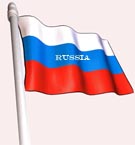Amnesty: Medvedev must make good on human rights commitments
 Moscow - Russia's new president Dmitry Medvedev must "initiate a sea-change" to bring about freedom of rights in his country, Amnesty International said Wednesday.
Moscow - Russia's new president Dmitry Medvedev must "initiate a sea-change" to bring about freedom of rights in his country, Amnesty International said Wednesday.
In a memorandum to the youngest-ever Kremlin leader, Amnesty placed hope in the airtime Medvedev gave to personal freedoms and the rule of law in his inauguration speech, but called him to account for the state's tightening of controls over the civil sector and other violations under his mentor Vladimir Putin's eight-year rule.
"A number of serious patterns of violations persist and in some cases have worsened in recent years," said the memorandum released as a supplement to the human rights watchdog's annual global report.
The London-based not-for-profit group focused on police crackdowns against opposition groups, mounting racial violence and rights violations in the North Caucasus, where Russian special forces are still fighting insurgences after two full-scale wars in the 1990s.
Western analysts have speculated on whether Medvedev, a former corporate lawyer, could bring a thaw to Kremlin policy and allow the stronger independence of Russia's courts.
The 42-year-old president, who succeed Putin in May, is seen as more liberal, harkening from a different generation and without the KGB background of his mentor Putin.
Nikola Davkvort, Amnesty's regional head, said of the report Wednesday: "This is our way of telling Medvedev, 'You have said publically in your inauguration speech that you place the highest value on human freedoms, here is what you can concretely do."
In a rare upbraiding of the authorities Tuesday, Russia's Constitutional Court ruled in favour of the head of a US-funded media freedoms NGO who was charged with smuggling for carrying cash into the country.
At a news conference Wednesday, Amnesty hailed the case in calling for "an urgent" review of a law passed to regulate NGOs in 2004 that it said was "overly burdensome and may have been applied to arbitrarily interfere with the work of independent media organizations."
In speeches Putin called NGOs spies and the tools of Western governments aimed at fomenting revolution. He moved to tighten the Kremlin's hand over NGOs and the media in a move analysts said stemmed from fear of the 2004 Orange Revolution in neighbouring Ukraine.
"Such court cases are very positive and important because the European Court (EC) decisions can't serve as a precedent in Russia since so few decisions are translated," said Friederike Behr, one of the authors of the Russian report.
There are currently over 9,000 cases involving Russia pending at the EC - far more than from any other country.
While Amnesty's global report Wednesday accused the United States and the European Union of failing to uphold the Universal Declaration of Human Rights (UNHDR), Behr cited the importance of international pressure such as from the EC to change Russian human rights norms.
When foreign leaders meet with civil society leaders on official visits to Moscow, she said, "it is already a form of protection by showing respect for NGOs that are otherwise accused of being foreign spies. It gives them authority - except maybe when it is the US leaders, of course."
But Amnesty regional director Davkort said the biggest barrier to the organization's work is "Russia's intolerance for any sort of criticism."
Russian Federation Council member Anatoly Kucherena, who heads a Russian think-tank created to monitor democracy violations in the West to counter groups like Amnesty, said Wednesday: "There's no sense in these reports."
"The new head of state staunchly monitors how the judicial system and other institutes of authority work. He sees and understands all, why would he need any other kind of reference?" he was quoted by news agency Interfax as saying. (dpa)